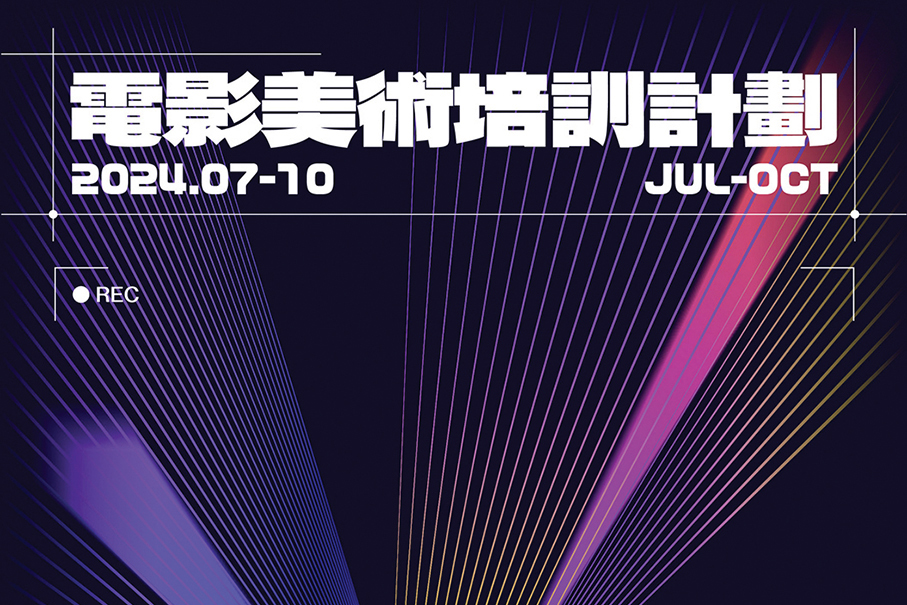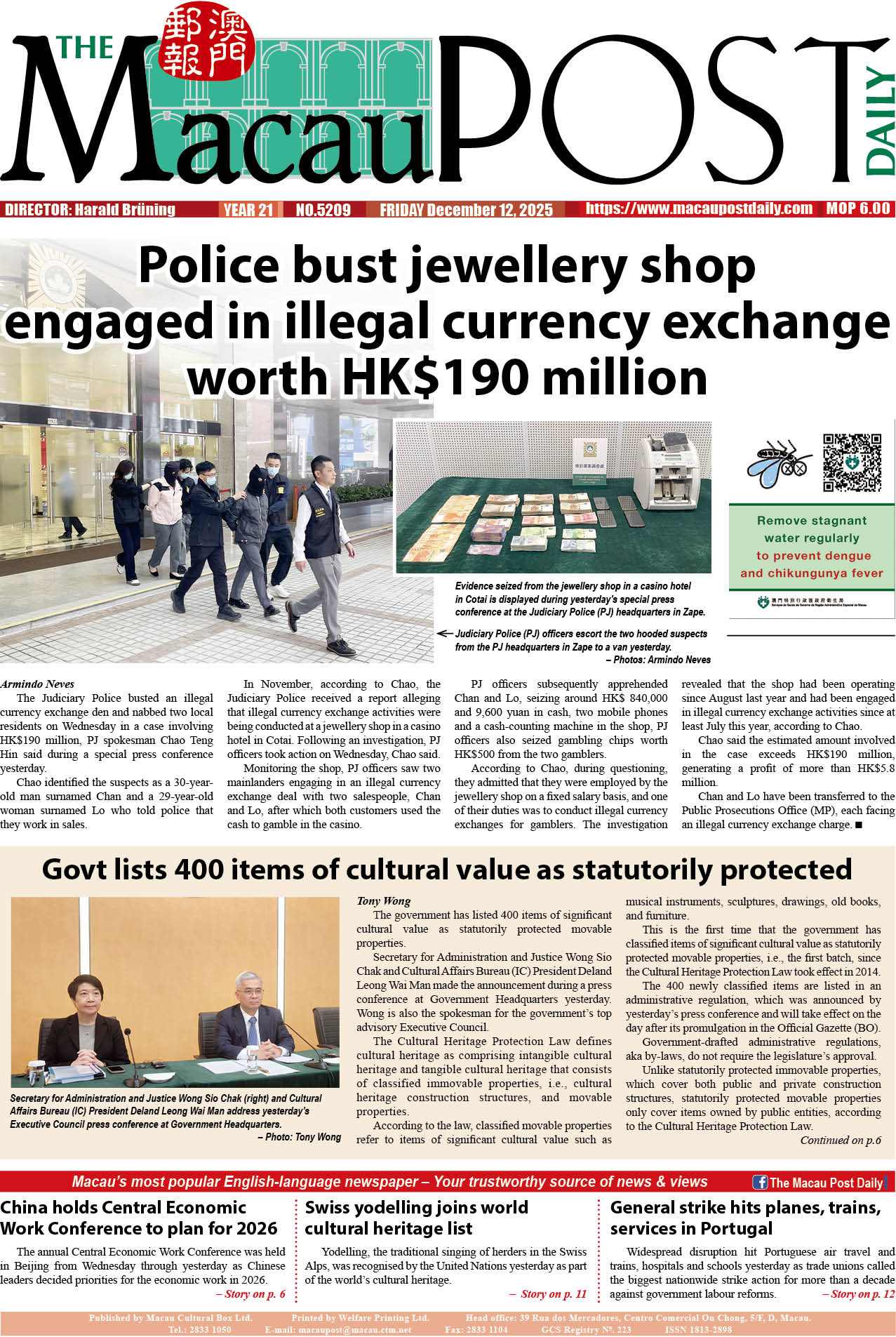US President Donald Trump is well known for his bombastic style but his unashamedly hegemonic tariff policy announcement last week surpasses all that he has done so far on the global stage.
In Macau, Trump’s “Liberation Day” – what a misnomer! – statement on April 2 – hard on the heels of All Fool’s Day pranks – was initially met with sheer bewilderment but quickly turned into great concern that even our tiny territory, which as a special administrative region (SAR), free port and separate customs territory of China could be affected sooner or later by his strong-arm trade policy.
Looking superficially at the predicament, the “good news” for Macau is that the United States accounted for a mere 1.4 percent of the SAR’s total value of exports in the first two months of the year. No big deal, or so it seems. But that’s a rather naïve way of looking at the issue. Obviously, the crux is that China is, quite obviously, the main target of his “Liberation Day” scheme – and Macau, as an integral part of the Chinese nation, can expect to be affected one way or the other by Trump’s China policy.
Historically, Macau has played an important role in China’s complicated – and often unfair – trade ties with the United States. The Treaty of Peace, Amity and Commerce between the United States and China was signed in Macau on July 3, 1844 at Kun Iam Temple of all places. It was the first of various unequal treaties imposed by the United States on the enfeebled Qing Dynasty. It was in force until the signing of the 1943 Sino-American Treaty for the Relinquishment of Extraterritorial Rights in China.
The study of history is important because it helps us understand the present and prepare for the future. While Trump may not have the time, interest and patience to study the complex history of China-US relations, some of his White House staffers and supporters should explain it to him, at least a brief summary – such as the painful history of bullying by the US and other Western powers that China and many other countries in what nowadays is known as the Global South have had to endure for centuries.
Even some of Trump’s diehard endorsers such as American billionaire hedge fund manager Bill Ackman have voiced their fears about his sledgehammer tariff policy. Responding to the “Liberation Day” announcement, Ackman wrote that “the President has an opportunity on Monday to call a time out and have the time to execute on fixing an unfair tariff system”… “alternatively, we are heading for a self-induced, economic nuclear winter, and we should start hunkering down.”
Well, Monday has passed and, as perhaps even Ackman expected, not only has Trump not changed his mind but he has meanwhile even doubled down on his coercive trade policy by threatening China with additional tariffs of 50 percent – a move that would drive the overall levies on Chinese goods to a nonsensical 104 percent.
As one would expect from a nation that has endured bullying by the West since the 19th century, Beijing yesterday vowed, understandably, to “fight to the end” against “blackmailing” by the US, reaffirming that it would “never accept” Trump’s usurious tariffs.
Commentators in the United States and elsewhere have even likened Trump’s tariffs to “economic terrorism” – certainly a term that comes across as shrill but, nevertheless, hits the nail on the head. Mitchell A. Sobieski, a journalist for the Milwaukee Independent, wrote in an article headlined “Milwaukee braces for trade shockwave after Trump uses ‘Liberation’ tariffs to attack global economies”, published on Saturday*, that “the comparison of Trump’s tariffs to ‘economic terrorism’, a term with no formal legal definition but used in global policy discourse,” is beginning to surface in policy analysis and media commentary.
“In this framing, the defining traits are intentional disruption of economic stability, broad civilian harm, and coercive policy aims.”
According to Sobieski, “the definition of economic terrorism, in this context, refers to the deliberate use of state economic power to destabilise markets, inflict civilian hardship, and exert political pressure without military engagement…, it describes a pattern of intentional, disproportionate disruption designed to cause financial suffering, provoke retaliation, and collapse cooperative structures.”
His article underlines that “when policies are deployed not to solve economic problems but to manufacture a crisis for strategic gain, they cease to be governance and enter the territory of coercion. This is not a trade policy. It is a doctrine of economic violence.”
I am quoting his article at length because I couldn’t agree more.
It also reaffirms my belief – and fear – that future wars will not only be fought with military means but also, or even mainly, with economic means”, i.e., the idea that armed conflicts will involve not just traditional military strategies but will increasingly rely on economic strategies as well. Of course, artificial intelligence (AI) has already joined the fray…
Well, that’s where the call for the so-called “bazooka” response to Trump’s tariff threats by a growing number of EU politicians, namely from France, Spain and Germany, comes in.
The “bazooka” is a type of portable, shoulder-fired anti-tank weapon that fires rockets. It was first developed by the US during World War II and is able to penetrate armour. It was effectively deployed first by the US and later also by the German army.
In EU jargon, the “bazooka” is the bloc’s anti-coercion instrument (ACI), which aims to punish any country using economic threats to exert pressure on the EU once diplomacy fails. Within the Trump tariff context, it gives Brussels potentially far-reaching powers such as restricting US companies from public tenders and limiting trade on services. Export-dependent Germany, the world’s third largest exporter after China and the US, has said that the EU should be prepared to deploy the “bazooka” if diplomacy fails to deliver.
I am all for it. If push comes to shove, Trump needs to feel the heat in order to convince him to get back on the right track of economic diplomacy.
I also think that Beijing, the other BRICS members, Brazil in particular, Brussels, the major European capitals (Berlin, Paris, London, Rome, Madrid) and many others should coordinate their response to Trump’s coercive tariffs that are indications of his outdated hegemonic thinking at a time when the world needs globalisation more than ever before so that it can tackle TOGETHER the many issues that our world is facing – poverty, climate change, pandemics, hunger, housing, education, etc.
Trump lives in the past. Even the United States as the world’s (still) top economy needs globalisation to succeed.
Tariffs per se are not always wrong – but those resulting from coercive trade policies certainly are.
Unlike strategic tariffs imposed to protect fledgling industries or punish targeted violations, as Sobieski rightfully points out, Trump’s “Liberation Day” tariffs function more as a sweeping disruption mechanism. April 2 was not a “Liberation Day” for the United States, but the opposite, it was its subjugation to outdated economic concepts such as hegemony and isolationism.
“Their impact is already inflicting pain far beyond political elites or offending firms. It is landing first on consumers, labourers, and small businesses. That alone shifts the moral framework of the policy,” Sobieski wrote.
As an eternal optimist (I always believe that the glass is half full, not half empty, a view that I share with my local media colleague José Carlos Matias whose latest editorial about Macau’s economic development is titled “The glass is… still half-full”) but also as a diehard realist, I do hope that Trump and his retinue will soon realise that their tariff threats are the wrong way to “Make America Great Again” (MAGA). I do not have any problem with his attempt to make his country great again, but please do it always based on the age-old principle of treating others the way you want to be treated. I am sure that all the world’s philosophical systems and creeds are on agreement on this principle for the simple reason that it is an expression of common sense.
Coercive and hegemonic tariffs make no sense at the beginning of the 21st century.
Besides, in a radio address to the nation on September 7, 1985, the then US president, Ronald Reagan, famously said that “American exporters and American workers deserve a fair shake abroad, and we intend to see they get it. Our objective will always be to make world trading partnerships freer and fairer for all. So, while we will use our powers as a lever to open closed doors abroad, we will continue to resist protectionist measures that would only raise prices, lock out trade, and destroy the jobs and prosperity trade brings to all. There are no winners in a trade war, only losers.”** I wonder whether Trump is aware of his fellow Republican’s wise remarks.
For the benefit of the whole world, I hope that China-US trade ties get back on track sooner rather than later. We all would benefit from it – even us here in tiny Macau.
What we need is cool-headed politics, i.e., rational decision-making and composure under pressure – while President Xi Jinping has made a name for himself as an imperturbable and indefatigable leader, Trump has widely been described as headstrong, emotional and impetuous. Well, their different character traits shouldn’t be an impediment for both heads of state to steer the boat of China-US relations safely back into harbour – TOGETHER.
The aim should be that, ultimately, there will be no need to deploy bazookas to prevent an economic nuclear winter.
– Harald Brüning
*https://www.milwaukeeindependent.com/explainers/milwaukee-braces-trade-shockwave-trump-uses-liberation-tariffs-attack-global-economies/ - Milwaukee braces for trade shockwave after Trump uses “Liberation” tariffs to attack global economies - Posted by Mitchell A. Sobieski | April 5, 2025
**https://www.reaganlibrary.gov/archives/speech/radio-address-nation-free-and-fair-trade - Radio Address to the Nation on Free and Fair Trade by Ronald Reagan








